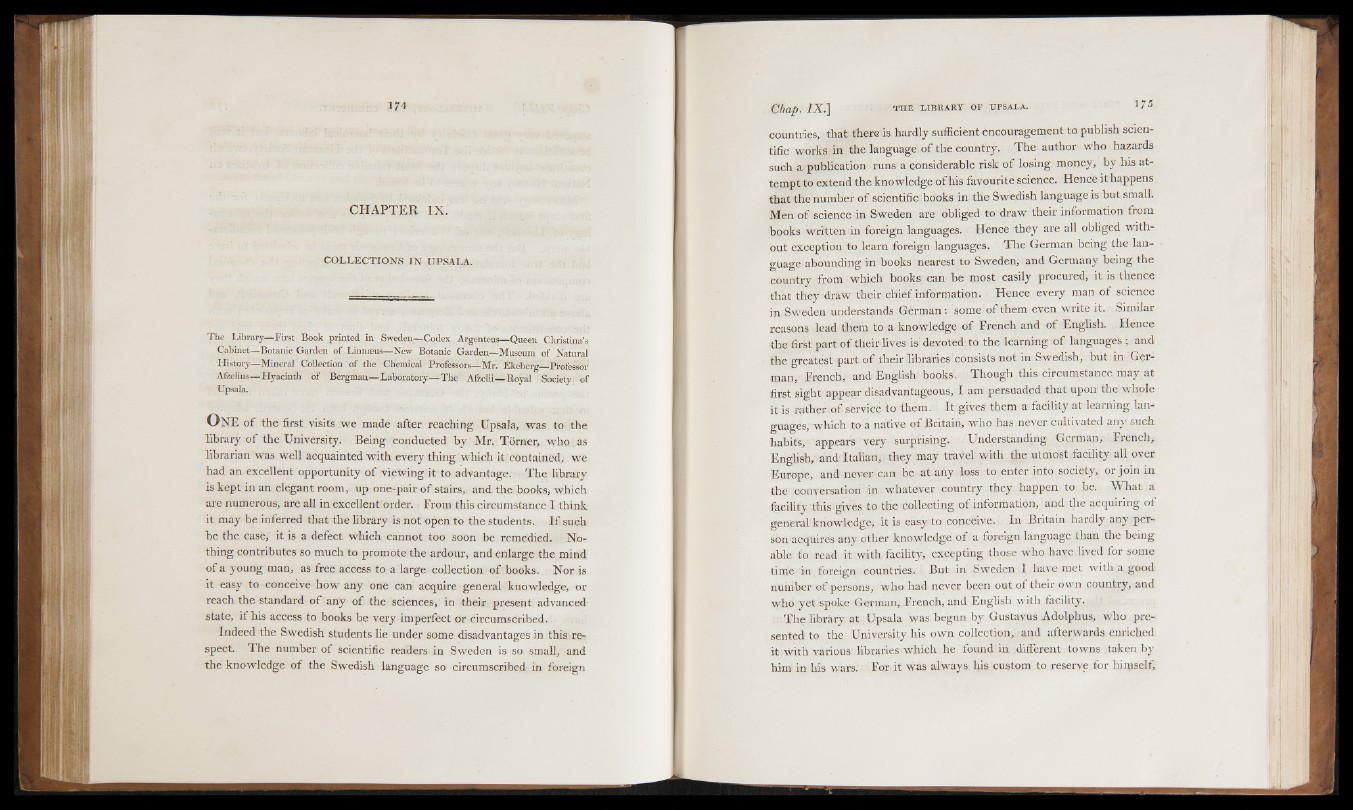
CHAPTER IX.
COLLECTIONS IN UPSALA.
The Library—First Book printed in Sweden—Codex Argenteus—Queen Christina’s
Cabinet—Botanic Garden of Linnaeus—New Botanic Garden—Museum of Natural
History—Mineral Collection of the Chemical Professors—Mr. Ekeberg—PrbfeSsbf
Afeelius—Hyacinth of Bergman—Laboratory—The Afzelii—Koyal Society of
Upsala.
O n e o f the first visits we made affer reaching Upsala, was to the
library of the University. Being conducted by Mr. Torner, who as
librarian was well acquainted with every thing which it .contained, we
had an excellent opportunity of viewing it to advantage. The library
is kept in an elegant room, up one-pair of stairs, and the books, which
are numerous, are all in excellent order. From this circumstanced think
it may be inferred that the library is not open to the students. I f such
be the case, it is a defect which cannot too soon be remedied. Nothing
contributes so much to promote the ardour, and enlarge the mind
o f a young man, as free access to a large collection of books. Nor is
it easy to conceive how any one can acquire general knowledge, or
reach the standard o f any of the sciences,: in their present: advanced
state, if his access to books be very imperfect or circumscribed.
Indeed the Swedish students lie under some disadvantages in this respect.
The number of scientific readers in Sweden is so small, and
the knowledge o f the Swedish language so circumscribed in foreign
countries, that there is hardly sufficient encouragement to publish scientific
works in the language of the country. The author who hazards
such a publication runs a considerable risk of losing money, by his attempt
to extend the knowledge o f his favourite science. Hence it happens
that the number of scientific books in the Swedish language is but small.
Men of science in Sweden are obliged to draw their information from
books written in foreign languages. Hence they are all obliged without
exception to learn foreign languages. The German being the language
abounding in books nearest to Sweden, and Germany being the
country from which books can be most easily procured, it is thence
that they draw their chief information. Hence every man o f science
in Sweden understands German: . some .of them even write it...Similar
reasons lead them to a knowledge of French and of English. Hence
the first part of their lives is'devoted to the learning o f languages;, and
the greatest part of their libraries'consists not in Swedish, but in German,
French, and English books. Though this circumstance may at
first sight appear disadvantageous, I am persuaded that upon the whole
it is rather-of service to them. It gives them a facility at learning languages,
which to a native of Britain, .who has .never cultivated any .Midi
habits, appears very surprising. Understanding German,): French;
English, and Italian, they may travel with the utmost facility all over
Europe, and never can be at any loss to enter into society, or join in
the conversation in whatever country they happen to be. What a
facility this gives to the collecting of information, and the acquiring of
general knowledge, it is easy, to conceive. In Britain hardly any person
acquires any other knowledge of a foreign language than the being
able to read it with facility, excepting those who have lived for some
time in foreign countries. But in Sweden I have met with a good
number of persons, who had never been out of their own country, and
who yet spoke German, French/and English with facility—
The library at Upsala was begun by Gustavus Adolphus, who presented
to the University his own collection, and afterwards enriched
it ■ with various libraries : which he found in different towns taken by
him in his wars. For it was always his custom to reserve for himself,